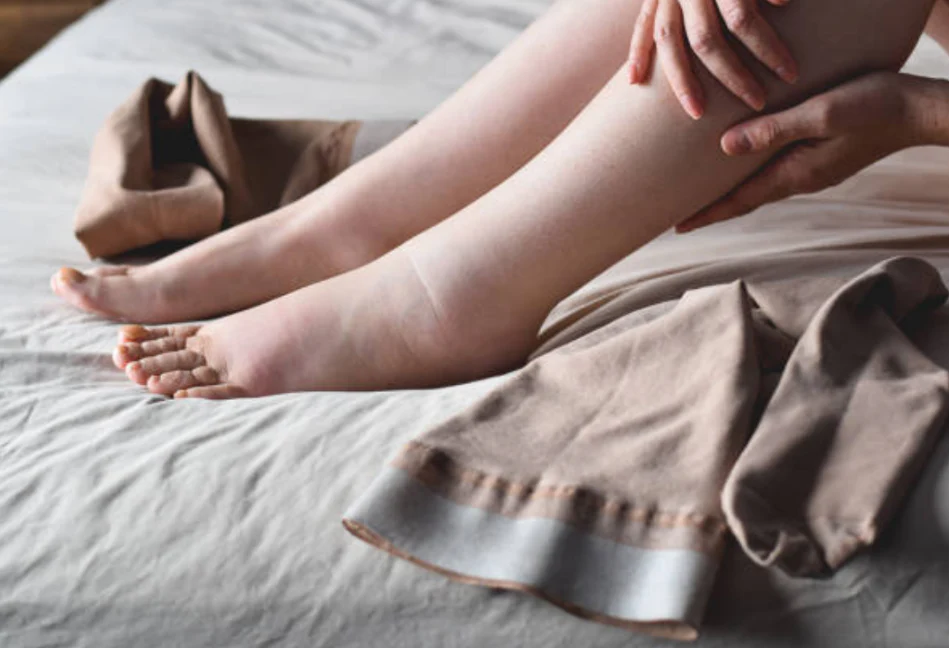
Neuropathy can cause sharp pain, tingling, and numbness in the feet. These symptoms stem from poor circulation and damaged peripheral nerves.
Diabetic patients, in particular, face peripheral neuropathy, leading to extreme foot sensitivity and daily discomfort.
Compression socks offer relief from neuropathy symptoms because they:
This article explores the benefits of compression socks for neuropathy in more detail.
Let’s begin.
Neuropathy is a medical condition described by damage in your peripheral nerves. This damage can make your feet feel numb or result in painful, tingling sensations. Generally, neuropathy occurs due to complications from diabetes affecting blood vessels and nerve health.
This medical condition disrupts how signals travel from your spinal cord to your body, affecting your sensitivity to stimuli and, therefore, your daily life.
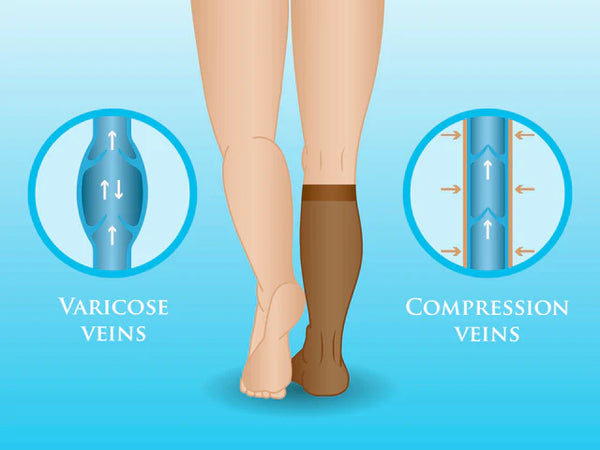
Compression socks are specialized hosiery designed to support your legs, improve your blood circulation and minimize swelling.
Compression socks apply graduated compression, which means they're tighter at the ankle and gradually decrease in pressure up the leg. This pressure helps move blood back to your heart, preventing fluid build-up and blood clots, like deep vein thrombosis.
The levels of compression vary, usually between 15-20 mmHg, 20-30 mmHg, and 30-40 mmHg to suit different needs.
Firmer compression socks with higher compression levels are typically used in medical settings to manage venous insufficiency and prevent venous thrombosis. For active people, compression socks can reduce strain and fatigue.
Remember: High-quality compression socks are made from moisture-wicking materials to keep your feet dry and cool. Quality compression materials also offer a snug fit, ensuring the socks stay in place without constricting movement or causing discomfort.
These socks are a go-to for healthier feet, whether you have specific health conditions or just need more support during daily activities.
strong>Insider tip: Healthy Legs offers an extensive range of medical-grade compression socks with precise mmHg options. For better results,try knee-high socks that combine compression with antimicrobial benefits. Choose the correct size for comfort, and consider their moisture-wicking designs to keep your feet dry during extended periods of use.
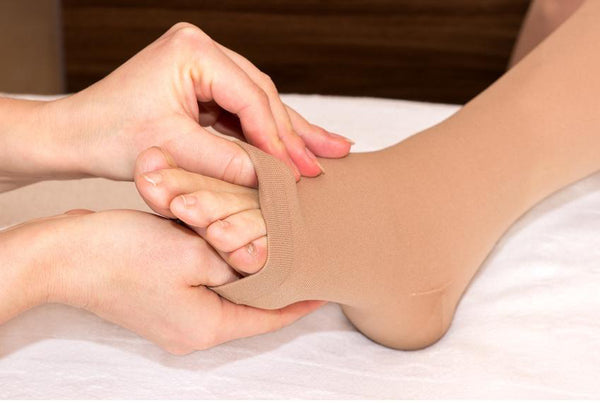
Compression socks can relieve neuropathy symptoms because they have the following effects:
Pro Tip: Using compression therapies along with graduated compression stockings lowers the risk of further complications, such as venous insufficiency or diabetic foot ulcers.
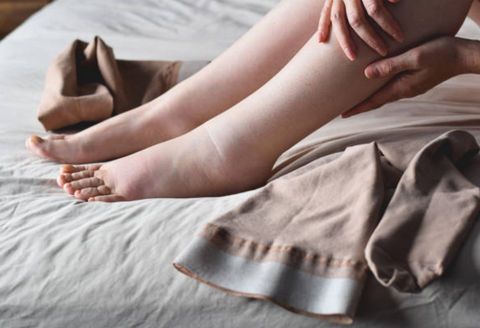
Neuropathy socks and regular compression socks serve different purposes. Understanding these differences helps you choose the perfect pair for your specific health needs.
Here’s what to consider:
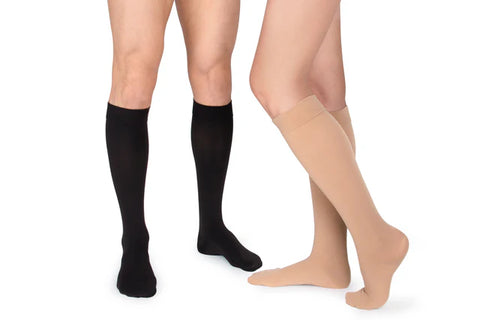
When choosing the best socks for neuropathy, consider these factors:
Remember: Chemotherapy can cause nerve damage, leading to neuropathy in your feet. Using medical-grade compression socks can ease discomfort and protect your sensitive feet from injuries during daily activities, reducing neuropathy symptoms caused by chemotherapy.
For diabetic neuropathy, you need socks that prioritize protection and comfort.
Here’s what to look for:
Inside Tip: For diabetic neuropathy, always check if your socks are medical-grade and do regular foot checks for early signs of foot ulcers or swelling. Avoid socks with tight bands, as they can reduce circulation.
Managing neuropathy involves more than just medication; it requires lifestyle adjustments.
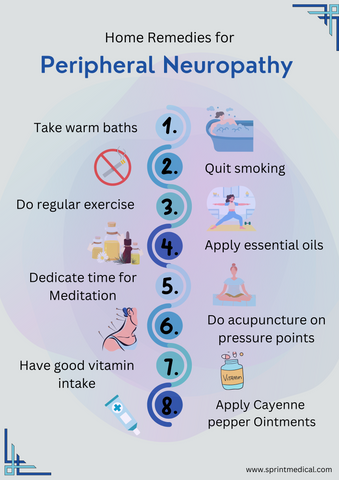
Here’s how you can help yourself:
Incorporating these practices helps maintain nerve health and manage symptoms, providing a foundation for a healthier daily life.
Insider Tip: To manage neuropathy more effectively, focus on daily foot temperature checks. Subtle temperature differences can signal early signs of inflammation or injury, even before pain occurs. Use a foot thermometer and compare both feet. This proactive step helps you catch potential issues before they worsen.
Compression socks offer significant relief for neuropathy patients by improving blood flow and reducing swelling.
They help prevent complications like varicose veins and support muscle recovery, making daily activities more comfortable.
Choosing the right socks can greatly enhance your quality of life.
It’s important to consult with a healthcare provider or vein specialist to determine the appropriate compression level and style for your specific needs. This ensures you benefit from compression therapy while avoiding any potential discomfort or adverse effects.
With the right guidance, compression garments can be a simple and effective solution for managing neuropathy symptoms.
Should you wear compression socks if you have neuropathy?
Yes, you can wear compression socks for neuropathy, but consult your healthcare provider first. Compression socks improve blood circulation, which can help reduce swelling and relieve symptoms. However, if you have severe peripheral neuropathy or poor circulation, improper compression levels may worsen your condition.
What socks are good for neuropathy?
Look for diabetic compression socks made from moisture-wicking material. These socks provide mild compression, reduce swelling, and offer extra care for sensitive feet. Neuropathy socks should have a seamless design and proper fit to prevent irritation while maintaining comfortable support throughout the day.
Does wearing socks to bed help neuropathy?
Wearing socks to bed can help keep your feet warm and improve blood flow circulation, especially in those with poor circulation. However, avoid socks that are too tight. Diabetic compression socks or light gradient compression socks are ideal for nighttime wear if recommended by your doctor.
Does compression help neuropathic pain?
Yes, compression can help manage neuropathic pain by improving blood circulation and reducing swelling. Proper levels of compression can reduce pressure on nerves, easing discomfort. Be cautious to choose the right compression level, as too much compression may cause more harm than relief.
When not to use compression socks?
You should avoid using compression socks if you have advanced peripheral neuropathy or severe venous disease. If you have skin ulcers, extreme foot sensitivity, or poor circulation, consult a medical professional before using compression socks. Improper compression levels can worsen symptoms and lead to complications.
What should you not do if you have neuropathy?
If you have neuropathy, avoid tight footwear or socks that can worsen circulation. Don’t expose your feet to extreme temperatures, as neuropathy may dull your sensitivity. Avoid excessive pressure on your feet during daily activities. Regularly check for injuries to prevent foot ulcers or infections.
What should I wear if I have neuropathy on my feet? Wear moisture-wicking, padded socks that keep your feet dry and prevent irritation. Diabetic compression socks or ankle compression socks provide mild compression to improve blood flow and reduce discomfort. Choose shoes with proper arch support and avoid anything too tight to reduce pressure on nerves.
How can I improve the circulation in my feet with neuropathy?
Improve circulation by wearing compression socks with appropriate compression levels, like 15-20 mmHg. Regular exercise, such as walking, boosts blood flow. Keeping your feet elevated during rest periods helps reduce swelling. Staying hydrated and managing your blood sugar levels are also key for better circulation. Vibration therapy can reduce pain and improve gait patterns.
What makes the neuropathy of the feet worse?
Neuropathy can worsen with poor circulation, high blood sugar levels, and lack of foot care. Tight footwear, prolonged periods of inactivity, or exposure to toxins can increase nerve damage. Foot injuries, untreated diabetic foot ulcers, and extreme temperatures may also aggravate neuropathy symptoms.
Does air compression help neuropathy?
Air compression can help neuropathy by improving blood flow circulation and reducing swelling in your legs and feet. Air compression sleeves apply gentle pressure, which may relieve neuropathic pain and reduce inflammation. However, always consult a healthcare provider before using any compression therapies.